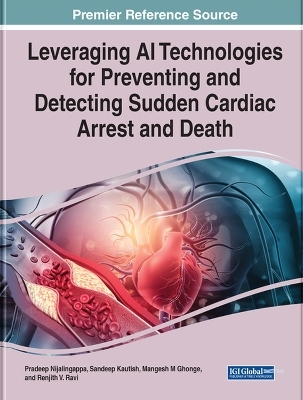
Leveraging AI Technologies for Preventing and Detecting Sudden Cardiac Arrest and Death
Seiten
2022
Business Science Reference (Verlag)
978-1-7998-8443-9 (ISBN)
Business Science Reference (Verlag)
978-1-7998-8443-9 (ISBN)
Addresses the impact and power of technology driven approaches for prevention and detection of Sudden Cardiac Arrest and Sudden Cardiac Death. The book provides insights on causes and symptoms of SCA and SCD and evaluates whether AI Technologies can improve the accuracy of cardiovascular risk prediction.
Sudden Cardiac Death (SCD) is a sudden, unexpected death caused by loss of heart function (sudden cardiac arrest) and Sudden Cardiac Arrest (SCA) occurs when the electrical system to the heart malfunctions and suddenly becomes very irregular. Death can often be a result if not handled quick enough or effectively. New technologies seek to help with this issue.
Data processing is a crucial step to developing prognostic models. Some of the challenges in data processing are non-linear prediction models, a large number of patients and numerous predictors with complicated correlations. In traditional hypothesis-driven statistical analysis it is difficult to overcome these challenges. Current approaches to predict cardiovascular risk fail to identify many people who would benefit from preventive treatment, while others receive unnecessary intervention. So, there is an emergent need of an adaptation of AI technologies such as Machine Learning and Deep Learning Techniques to overcome the challenges.
The Machine Learning (ML) approaches have great potential in increasing the accuracy of cardiovascular risk prediction and to avoid unnecessary treatment. The application of ML techniques may have the potential to improve Heart Failure outcomes and management, including cost savings by improving existing diagnostic and treatment support systems. Moreover, ML algorithms can also be applied to predict SCD. Also, Machine Learning offers an opportunity to improve accuracy by exploiting complex interactions between risk factors.
The book addresses the impact and power of technology driven approaches for prevention and detection of SCA and SCD. It will provide insights on causes and symptoms of SCA and SCD and evaluate whether AI Technologies can improve the accuracy of cardiovascular risk prediction. It will explore the current issues and future technology driven solutions for SCA and SCD prevention and detection.
Sudden Cardiac Death (SCD) is a sudden, unexpected death caused by loss of heart function (sudden cardiac arrest) and Sudden Cardiac Arrest (SCA) occurs when the electrical system to the heart malfunctions and suddenly becomes very irregular. Death can often be a result if not handled quick enough or effectively. New technologies seek to help with this issue.
Data processing is a crucial step to developing prognostic models. Some of the challenges in data processing are non-linear prediction models, a large number of patients and numerous predictors with complicated correlations. In traditional hypothesis-driven statistical analysis it is difficult to overcome these challenges. Current approaches to predict cardiovascular risk fail to identify many people who would benefit from preventive treatment, while others receive unnecessary intervention. So, there is an emergent need of an adaptation of AI technologies such as Machine Learning and Deep Learning Techniques to overcome the challenges.
The Machine Learning (ML) approaches have great potential in increasing the accuracy of cardiovascular risk prediction and to avoid unnecessary treatment. The application of ML techniques may have the potential to improve Heart Failure outcomes and management, including cost savings by improving existing diagnostic and treatment support systems. Moreover, ML algorithms can also be applied to predict SCD. Also, Machine Learning offers an opportunity to improve accuracy by exploiting complex interactions between risk factors.
The book addresses the impact and power of technology driven approaches for prevention and detection of SCA and SCD. It will provide insights on causes and symptoms of SCA and SCD and evaluate whether AI Technologies can improve the accuracy of cardiovascular risk prediction. It will explore the current issues and future technology driven solutions for SCA and SCD prevention and detection.
Pradeep Nijalingappa, Bapuji Institute of Engineering and Technology, India Sandeep Kautish, Lord Buddha Education Foundation, Nepal & Asia Pacific University of Technology & Innovation, Malaysia
| Erscheinungsdatum | 01.12.2021 |
|---|---|
| Reihe/Serie | e-Book Collection - Copyright 2022 |
| Sprache | englisch |
| Maße | 216 x 279 mm |
| Gewicht | 287 g |
| Themenwelt | Informatik ► Theorie / Studium ► Künstliche Intelligenz / Robotik |
| Medizinische Fachgebiete ► Innere Medizin ► Kardiologie / Angiologie | |
| Technik ► Medizintechnik | |
| ISBN-10 | 1-7998-8443-0 / 1799884430 |
| ISBN-13 | 978-1-7998-8443-9 / 9781799884439 |
| Zustand | Neuware |
| Informationen gemäß Produktsicherheitsverordnung (GPSR) | |
| Haben Sie eine Frage zum Produkt? |
Mehr entdecken
aus dem Bereich
aus dem Bereich
Buch | Softcover (2024)
REDLINE (Verlag)
CHF 27,95
Eine kurze Geschichte der Informationsnetzwerke von der Steinzeit bis …
Buch | Hardcover (2024)
Penguin (Verlag)
CHF 39,20


